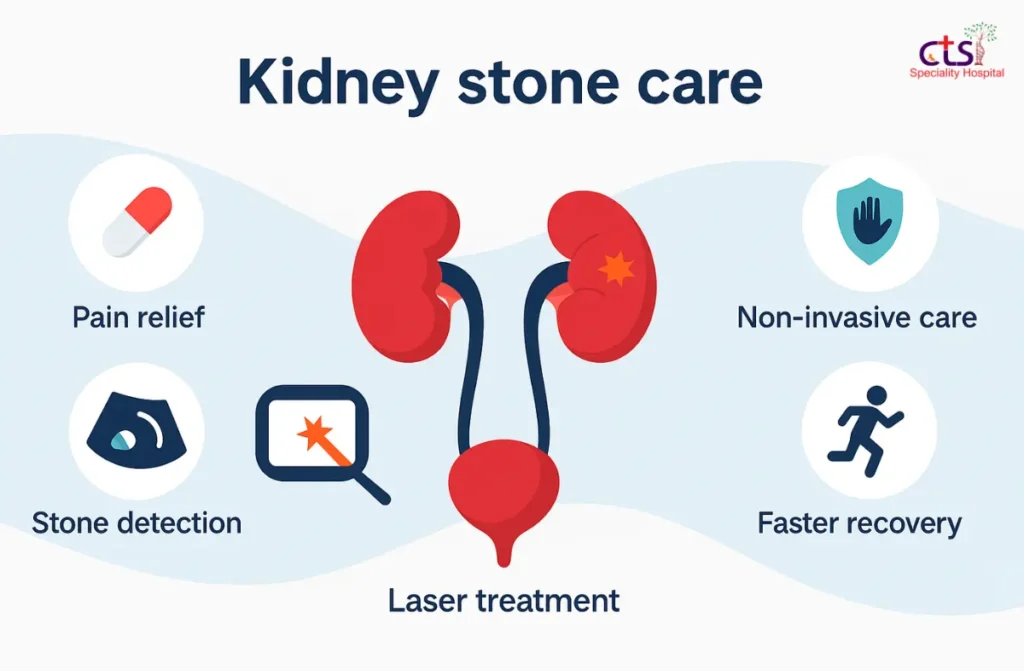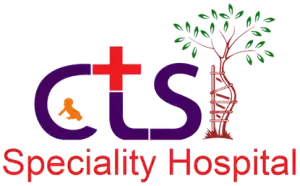Kidney stones are hard, crystal-like deposits formed from minerals and salts that build up inside the kidneys. They vary in size, ranging from tiny grains that pass unnoticed to larger stones that cause severe pain and discomfort. Common causes include dehydration, dietary habits, and certain medical conditions that increase mineral concentration in the urine. Symptoms often involve sharp back or abdominal pain, blood in the urine, and difficulty passing urine. With advancements in medical care, effective kidney stones treatment in Chennai is available, offering safe and tailored solutions to manage and prevent this condition.
What is a Kidney Stone?
Kidney stones are hard deposits of minerals and salts that form inside your kidneys. These stones can range in size from tiny grains to large masses. The most common types are made of calcium oxalate, but there are others made of uric acid or struvite. The formation of kidney stones can be extremely painful and may lead to complications if left untreated. Kidney stones treatment in Chennai is essential to prevent further damage to the kidneys and provide relief from pain.
How Common Are Kidney Stones?
Kidney stones are quite common. It’s estimated that 1 in 10 people will experience kidney stones at some point in their life. Factors such as diet, dehydration, and genetics can increase the likelihood of developing kidney stones. For residents of Chennai, timely intervention with the best kidney stone treatment in Chennai can help avoid recurrence and manage symptoms effectively.
Common Symptoms of Kidney Stones
- Severe Pain in the Back and Side: One of the most common symptoms of kidney stones is intense pain that typically starts in the lower back or side, just below the ribs. This pain may radiate to the abdomen or groin area and often comes in waves, making it difficult for patients to remain still.
- Blood in the Urine: Kidney stones can cause irritation or damage to the urinary tract lining, leading to hematuria (blood in urine). The urine may appear pink, red, or brown, depending on the severity, and this is usually a strong indicator that medical attention is needed for proper kidney stones treatment in Chennai.
- Frequent and Painful Urination: As the stone moves down into the ureter, it may cause a persistent urge to urinate more often than usual. The process is usually accompanied by a burning sensation or discomfort, which can be confused with urinary tract infections.
- Nausea and Vomiting: The body’s response to the intense pain caused by kidney stones can often include nausea and vomiting. This symptom arises due to the nerve connections between the kidneys and the gastrointestinal system.
- Difficulty Passing Urine: In some cases, larger stones may obstruct the flow of urine, leading to reduced output or a complete inability to urinate. This can result in complications if not addressed quickly through proper kidney stone removal in Chennai.
Causes of Kidney Stones
- Dehydration and Low Fluid Intake: Not drinking enough water is one of the most significant causes of kidney stones. Low hydration levels increase the concentration of minerals and salts in the urine, making it easier for crystals to form and develop into stones.
- Excessive Intake of Salt and Protein: Diets high in sodium and animal protein can raise calcium and uric acid levels in the urine. This imbalance encourages stone formation, which may require medical management such as kidney stones treatment in Chennai to prevent recurrence.
- Genetic and Family History: Individuals with a family history of kidney stones are more likely to develop them due to inherited metabolic tendencies. These genetic factors can influence how the body processes calcium, oxalate, and other stone-forming substances.
- Medical Conditions and Medications: Conditions such as hyperparathyroidism, obesity, urinary tract infections, and digestive disorders can increase the likelihood of stone formation. Certain medications like diuretics or calcium-based antacids may also contribute to stone buildup, requiring timely kidney stone removal in Chennai when complications arise.

Types of Kidney Stones
- Calcium stones: Most common, formed from calcium oxalate.
- Uric acid stones: Formed when urine is too acidic.
- Struvite stones: Associated with urinary tract infections.
- Cystine stones: Rare and occur in people with a genetic disorder.
Understanding the type of stone you have helps determine the appropriate kidney stones treatment in Chennai.
Risk Factors for Kidney Stones
- Dehydration: Causes concentrated urine, which leads to stone formation.
- Dietary factors: High intake of oxalates, calcium, or animal protein.
- Obesity: Increases the likelihood of stones.
- Medical conditions: Such as gout or hyperparathyroidism.
For a tailored treatment plan, kidney stone removal in Chennai by specialists can help reduce the risk.
Diagnosis of Kidney Stones
- Physical Examination and Medical History: The diagnosis of kidney stones usually begins with a detailed review of symptoms, medical history, and family background. Doctors may also perform a physical examination to identify tenderness in the back or abdomen, which often indicates stone-related discomfort.
- Urine and Blood Tests: Laboratory tests help detect high levels of calcium, uric acid, or other minerals that promote stone formation. Urine analysis can also reveal infections or crystals, providing early clues for starting appropriate kidney stones treatment in Chennai.
- Imaging Tests: Advanced imaging methods such as ultrasound, X-rays, or CT scans are commonly used to confirm the presence, size, and location of kidney stones. CT scans are particularly effective in detecting even the smallest stones that other imaging methods might miss.
- Specialized Diagnostic Procedures: In certain cases, doctors may recommend intravenous urography or digital X-ray techniques to assess kidney function and urinary tract blockages. These precise diagnostic steps are critical for planning effective kidney stone laser treatment in Chennai.
Treatment for Kidney Stones
- Medications and Lifestyle Changes: Small kidney stones often pass naturally with the help of increased water intake and prescribed medications that relax the ureter. Pain relievers and dietary adjustments, such as reducing salt and oxalate-rich foods, can also help manage symptoms and prevent recurrence.
- Extracorporeal Shock Wave Lithotripsy (ESWL): This non-invasive method uses sound waves to break larger stones into smaller fragments, making them easier to pass through urine. It is generally recommended for stones located in the kidney or upper urinary tract.
- Ureteroscopy: In this procedure, a thin scope is inserted through the urinary tract to locate and remove the stone or break it into smaller pieces. It is particularly useful for stones lodged in the ureter and ensures precise removal with minimal tissue damage.
- Advanced Laser and Surgical Treatments: For larger or complex stones, advanced procedures such as percutaneous nephrolithotomy or kidney stone laser treatment in Chennai are used to ensure effective removal. These treatments are highly effective and often recommended when conventional approaches fail, offering a reliable solution as part of comprehensive kidney stones treatment in Chennai.
Small stones with minimal symptoms
- Increased water intake: Drinking more fluids helps flush out small stones.
- Pain management: Over-the-counter pain relievers.
- Medications management: Certain medications can help pass small stones.
- Kidney stone laser treatment in Chennai: Non-invasive options like this are often used to break small stones.
The kidney stone laser treatment cost in Chennai may vary based on the complexity of the treatment.
Large stones and those that cause symptoms
- Shockwave Lithotripsy (SWL): Uses sound waves to break large stones into smaller fragments.
- Surgical removal: In some cases, surgery may be necessary.
- Percutaneous nephrolithotomy (PCNL): For very large stones, a small incision is made to remove them.
Effective kidney stones treatment in Chennai ensures that even larger stones can be treated safely.
Prevention of Kidney Stones
- Drink plenty of water: Staying hydrated helps prevent stone formation.
- Limit salt and sugar: A balanced diet reduces the risk.
- Increase dietary calcium: Proper calcium intake can help prevent oxalate stones.
- Medications and Exercise: For those with a history of stones, medications may be prescribed.
With best kidney stone treatment in Chennai, patients can manage their risk factors and reduce the chances of recurrence.
Conclusion
Kidney stones treatment in Chennai is available at leading hospitals like Cts Hospital, offering the latest technologies and expertise in treating kidney stones. From kidney stone laser treatment cost in Chennai to personalized care, patients can receive the highest quality treatment. If you’re facing kidney stones, consult with a specialist to determine the most appropriate treatment for your condition.
